
ANDRO Computational Solutions, LLC of Rome, NY was announced a finalist of the Army xTech Small Business Innovation Research (SBIR) Waveform Challenge. Principal Investigator, Dr. Ashwin Amanna and his team leveraged pioneering work in software-based tactical waveform implementations under the Waveform Agile System Palette (WASP) project supporting the Air Force Research Laboratory Information Directorate (AFRL/RI).
The xTech Challenges were designed to address the rapid procurement needs of the warfighter and encourage broader participation from the technology sector. This specific challenge problem addressed the Army’s need to decouple waveforms from software defined radio (SDR) platforms to support greater competitiveness, flexible procurement, and ease of transitioning waveforms in the information repository to new platforms. The Army’s long-term goal is a standardized, open architecture, non-proprietary SDR that may be configured to adapt to various waveforms, frequency bands, bandwidths, and modes of operation.
The xTech Challenge process started with a 4-page concept whitepaper. ANDRO’s submission was awarded $10,000 in prize money and selected along with 10 others to move forward to virtual Technology Pitches to senior Army Science and Technology leaders. With only 20 minutes and 15 slides, ANDRO presented an approach, in partnership with Collins Aerospace, to develop a reference demonstration of GPP-based waveforms operating on heterogeneous SDR platforms with a standardized interface between the waveform and SDR. The ANDRO team was selected as one of 5 finalists to receive $50,000 in prize money and invited to submit a full proposal. The ANDRO/Collins approach had sufficient merit to qualify for a rare Direct to Phase II $1.7M SBIR proposal.
ANDRO’s approach focuses on integrating existing tactical waveforms with SDR platforms. Waveforms will include streaming-based (BE-CDL), TDMA burst dependent (DDL), and potentially a frequency hopping waveform (RLFH1). ANDRO and Collins will define an interface between the waveform and SDRs leveraging existing standards, such as Open Communications Subsystem (OCS) V2.0 and MORA. The interoperability of a waveform across platforms using identical waveform code will be demonstrated to show decoupling of waveform from hardware using the basic system model shown.


